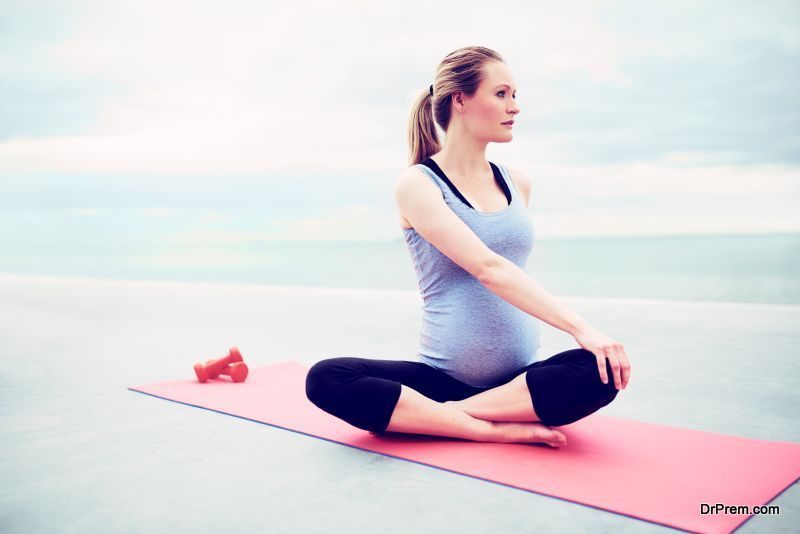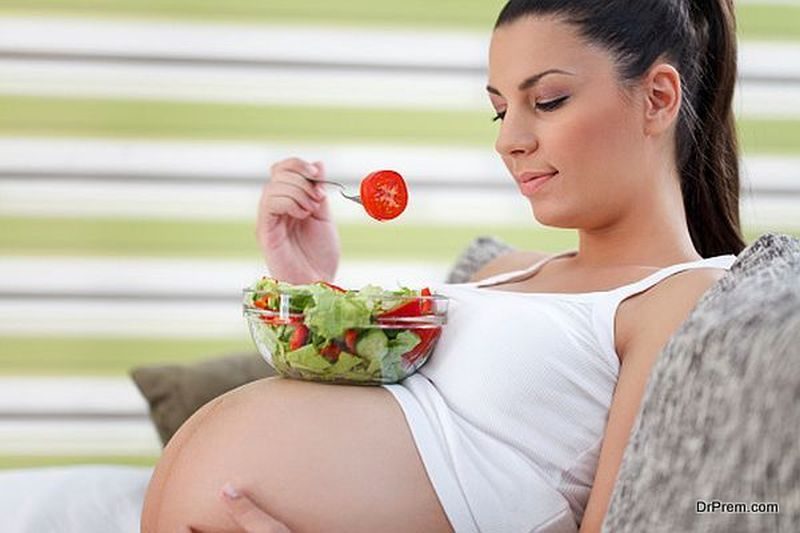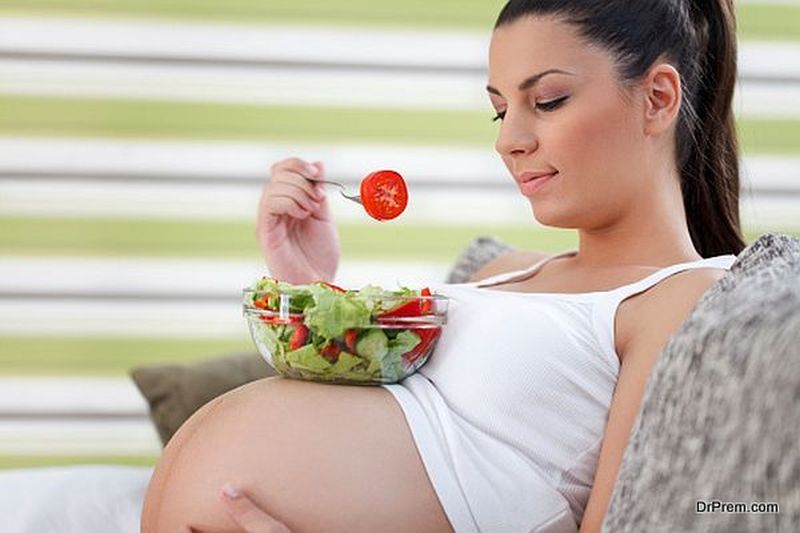A woman’s pregnancy is one of the most significant times in her life. Your body is changing almost daily, and doctors are constantly monitoring your health and medical status. But there are some helpful things that expecting mothers can do in order to maintain a healthy and happy pregnancy. Here are 10 ways to help make your 40 weeks of pregnancy enjoyable and free from complications.
Exercise
 Exercising during your pregnancy will not only help you maintain a healthy weight, but it will keep energy levels high and make your return to a workout routine postpartum much easier. Exercise can also boost your mood, improve circulation, and result in a better night’s sleep.
Exercising during your pregnancy will not only help you maintain a healthy weight, but it will keep energy levels high and make your return to a workout routine postpartum much easier. Exercise can also boost your mood, improve circulation, and result in a better night’s sleep.
Most doctors recommend continuing your normal, pre-pregnancy exercise routine, though you may need to adjust intensity and duration. These adjustments are mostly dependent on how you’re feeling throughout your pregnancy and if you’re facing any complications or specific restrictions. Even if you’re not feeling up to the same exercises you once were, a nice brisk walk, yoga, or even swimming are great, low impact exercises for pregnant women.
Ask for Help
A healthy amount of regular activity during your pregnancy is recommended. There’s no reason to completely alter your lifestyle, but there’s also no need to avoid asking for help. In fact, now is the time to take as much help as people are willing to offer! If you’re feeling exceptionally tired one day or your back and feet are bothering you, accept that friend’s offer to go grocery shopping for you or drive you to your doctor’s appointment. It’s better to ask for assistance when needed than push yourself too hard or far while pregnant. Overexertion can increase your risk for complications.
Rest
 Growing a baby is a lot of work! You might find yourself exceptionally tired during the first trimester. This is due in part to the hormonal changes your body is undergoing. Your body is producing more blood to help carry nutrients to your growing baby. This shift in blood production also affects your blood pressure and blood sugar levels. All of these changes lead to fatigue during early weeks of pregnancy.
Growing a baby is a lot of work! You might find yourself exceptionally tired during the first trimester. This is due in part to the hormonal changes your body is undergoing. Your body is producing more blood to help carry nutrients to your growing baby. This shift in blood production also affects your blood pressure and blood sugar levels. All of these changes lead to fatigue during early weeks of pregnancy.
But don’t be fooled into thinking once you pass the first 12 weeks that you won’t still be tired. You’ll likely have good and bad days as far as your energy levels are concerned. If you feel extra sleepy one day, it’s important that you listen to your body. Slow down and take a rest. Sit with your feet up for a few minutes or take a nap. Your body knows what it needs and fatigue or feelings of weakness are a sure sign that you need to take a break.
Clean with Caution
Not only does house cleaning become a bit more difficult once your baby, and your belly, get bigger, but overexposure to certain cleaning products and chemicals can also be unhealthy. You don’t want to be inhaling or coming in contact with toxic chemicals that can harm you or your baby. But cleaning materials aren’t the only things to avoid when it comes to common household chores.
Pregnant women should not perform any type of heavy lifting or stand for too long at a time. This means no moving furniture to dust or vacuum and resting in between tasks. Climbing while pregnant is also a no-no! This means avoiding any type of ladder or step stool and asking for help to reach those difficult places.
Indulge

That’s right – although maintaining a healthy weight during pregnancy is important, it’s also important to allow yourself to indulge in some of your body’s natural cravings. Pregnancy is not a time to diet, but it’s also not an excuse to eat everything and anything with no regard for portion size or moderation.
If you’re craving ice cream, have it! But portion out your treat into a bowl, versus grabbing the gallon and a spoon. This will keep you from overdoing it. Cravings are a natural part of pregnancy. Cravings may have emotional roots or can act as your bodies way of telling you that you need certain foods or nutrients you may be lacking. Either way, don’t ignore your cravings, just practice mindful snacking.
Take Prenatal Vitamins
Consuming the recommended dose of vitamins, minerals, and certain foods is an important part of a healthy pregnancy. There are foods to avoid, which will be covered later, but there are also certain nutrients you and your baby need to grow and flourish. These nutrients are most important during your first trimester, when your baby’s neural cord is developing. The best prenatal vitamins provide folic acid, calcium, and iron. You can also take these vitamins while trying to conceive. It’s never too early in the pregnancy journey to consume these essential nutrients.
Choose Foods Carefully
 There are several foods that pregnant women are encouraged to avoid, due to potential health complications. These include, but are not limited to:
There are several foods that pregnant women are encouraged to avoid, due to potential health complications. These include, but are not limited to:
- Lunch meat: Risk of listeria
- Raw meat: Risk of bacterial infections such as salmonella and toxoplasmosis
- Fish with mercury: Risk of developmental delays and brain damage
- Raw eggs: Risk of salmonella
- Soft cheese: Risk of listeria
Different doctors may advice more strongly against the above mentioned foods, as well as others. Do your research on what risks these foods contain, and others, throughout your pregnancy. Be sure to ask questions when dining out about how foods are prepared and what ingredients they contain. Remember, your baby consumes everything you consume, so be sure to choose your foods wisely.
Track Your Weight
It’s important to gain a healthy amount of weight over these 40 weeks. You are eating for two, but just remember that residual “baby weight” is a common problem for many women following delivery day. A woman of average weight before becoming pregnant should gain between 25 and 35 pounds during this time. But gaining too little weight can actually lead to low birth weight in your baby, which may cause development complications down the road. It’s important to track your weight throughout your pregnancy to ensure that you’re gaining at a healthy rate.
Wear Sunscreen

Did you know that your skin is more sensitive to the sun during pregnancy? This means pregnant women are more at risk for sunburn, as well as dark blotchy spots on the skin and face. It’s important to protect your skin by using sunscreen, sunglasses, large hats, and clothing. It’s also suggested you limit your time in the sun and choose destinations that offer plenty of opportunity for shade.
Travel Wisely
If you have a vacation or trip planned during your pregnancy, there’s no reason for you to miss out. But, there are some precautions you should take if you’re traveling while pregnant. The most obvious question that often comes to mind is whether or not it’s safe to fly while pregnant. The best time to fly is between 12 and 30 weeks of pregnancy. This is because the fear of miscarriage or early delivery is lowest. Make sure that the airline you choose does not have any restrictions for pregnant women and be sure to check with your doctor before booking a flight.
Another tip for traveling toward the end of your pregnancy is not to go too far! Once you’ve entered your third trimester, and especially after you’ve hit the 36 week mark, labor pains could be right around the corner. You don’t want to find yourself too far from your doctor or hospital when your baby is ready to enter the world.
Embrace this Time

Pregnancy is a beautiful and life-changing event that should be cherished. With just a little forethought and planning, you can plan a healthy pregnancy that offers well-rounded care and a balance of activities that make you feel good, rested, and fully-prepared to meet your new edition.
Article Submitted By Community Writer




